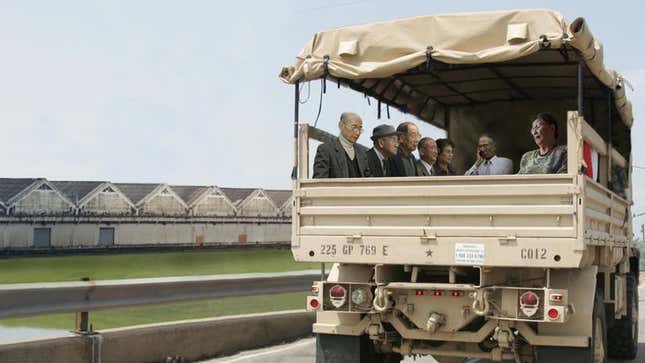
POSTON, AZ—Commemorating the internment during World War II of nearly 120,000 innocent Japanese-Americans, U.S. authorities this week reportedly tracked down and apprehended thousands of the now-elderly detention camp survivors for a 70th anniversary reunion.
Packing the onetime detainees into buses, armed guards forcibly returned them to their cramped, ramshackle barracks at the Poston War Relocation Center—just one of many sites across the country in which aging Japanese-Americans accused of nothing more than their ancestry have been given the chance to revisit a powerful, formative event from their pasts.
“After finding out where all the internment alumni now live, we removed them from their homes and hospital beds and brought them here, to the camp, so they could reconnect with old friends and take part in the ongoing festivities,” said U.S. Army Lt. Col. Grant Lowry, who oversees the recently reactivated prison in the Arizona desert. “We’re hoping that by rounding everyone up and getting them back behind the barbed wire, they’ll be able to relive some memories from long ago, and maybe even make a few new ones!”
“The celebration is mandatory,” Lowry added.
Military reports indicated that the former internees—the majority of whom were U.S. citizens seven decades ago and still are today—began their nostalgic reunion experience by arriving at the detention camp with nothing more than the clothes on their backs. Each was then shoved into a tiny barrack that he or she will share with two dozen or so fellow alumni, “just like old times.”
According to sources, though many of the Japanese-American survivors are now in their nineties and suffering from various forms of dementia, a flood of memories from their youth came rushing back when they were once more summarily expelled from their neighborhoods and forced to abandon their homes, businesses, cars, and pets.
“Many were too overwhelmed to speak, but the looks on their faces said it all,” said Army Capt. Amanda Gilmore, adding that the elderly men and women became emotional upon having their old identification tags strung around their necks. “You could tell they were really surprised to be going through this all over again. I mean, they were just kids the first time around, so it’s neat that they can come back.”
After being processed at the internment center, stripped of contraband, and deloused, the newly reinstated detainees were reportedly astonished to discover that with the exception of a festive “70th Anniversary Celebration” banner hanging from its gated entrance, the camp remained largely unaltered, its facilities featuring the same rustic sanitary facilities, lack of adequate shelter, and dangerous shortages of food and medical supplies.
The returning inmates are said to have partaken in many of the same activities that filled the days of their youth: huddling around makeshift campfires, using unpartitioned toilets, and building their own classrooms out of adobe just so they could attend school. This familiar routine, Gilmore said, has allowed the seniors to revisit that special place where they spent a substantial portion of their young lives.
“The second they see the machine gun nests or hear that voice on the loudspeaker calling them to the yard for the morning head count, you can see it hit them: They’re back,” Gilmore said of the internees who, in the festive spirit of the anniversary, have again been pressured to swear allegiance to their U.S. captors and to inform on their fellow prisoners. “These folks may be getting on in their years, but you’d be surprised how well some of them can still stand up to hours of interrogation.”
“We’re just so glad we were able to this before it was too late,” she added.
Military officials acknowledged the 70th anniversary events had been postponed for months due to the difficulty of assembling the former detainees, many of whom the Army “spent forever trying to find, only to realize a bunch had actually died in the camps back in the 1940s.”
Stressing the importance of continuing to honor the rich legacy of the internment experience, Gilmore told reporters she believes the nation as a whole is doing just that.
“Most Americans are celebrating the anniversary by doing what they’ve always done: pretending none of this ever happened,” she said.